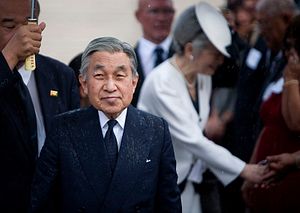The Japanese Emperor Akihito, 82, has expressed a wish to abdicate from the Chrysanthemum Throne, according to a report on Wednesday by the public Japanese broadcaster, NHK.
However, soon afterward, Japan’s Imperial Household Agency, the government body that runs royal affairs, strongly denied such a thing was being considered, while Prime Minister Shinzo Abe refused to offer comment.
However, it is unlikely that the Japanese media would speculate on an issue of such import without their being a strong basis to do so. If the emperor were to abdicate, he would be succeeded by his son, Crown Prince Naruhito. The last time an abdication occurred in Japanese history was in 1817, when the Emperor Kokaku passed the throne to his fourth son, the Emperor Ninko.
While it is difficult to ascertain the truth of the matter, the report likely reflects the emperor’s true wishes. Given his age, it is certainly reasonable for him to want to pass on his duties to his heir, aged 56. Additionally, he has been suffering from various ailments including heart problems, prostate cancer, and influenza. At a press conference last year, he said “I shall turn 82 on this birthday. I am beginning to feel my age, and there were times when I made some mistakes at events.”
However, unfortunately, the emperor might not have much choice in the matter. The Japanese Imperial family has too little control over their own affairs, even by the standards of a constitutional monarchy. While the British monarch, for example, may discuss many political matters in private with politicians, the Japanese monarch is constitutionally required to be strictly apolitical.
Because the imperial family no longer has any political role, all changes to its activities, structure, and status are governed by the Japanese Diet via the Imperial Household Act of 1947. The Japanese Diet would have to revise this act in order to permit the Emperor Akihito to abdicate, as the law states that the throne passes on only after the death of a monarch. The law, and the related Imperial Household Agency, have come under sustained criticism over the past dozen years, for their rigidity.
The Imperial Household Agency, in line with the Imperial Household Act, were reported to have put enormous pressure on Crown Princess Masako to bear a male heir (she has one daughter, Aiko). This led to her suffering from numerous health issues as well as depression.
The Agency has also been criticized for isolating family members, being obsessed with ritual, and obstructing attempts to change the law to allow for female succession to the throne. At times, it appears as though it seeks to run the imperial family’s affairs like a prison regime.
In light of the ruling Liberal Democratic Party (LDP)’s desire to revise the Japanese constitution, it should seriously consider loosening restrictions on the Emperor. After all, after World War II, the emperors of Japan only renounced being living gods, not the fact that they themselves are descended from the goddess Amaterasu. A 2012 draft of proposed changes to the constitution by the LDP would give the Emperor more power. He would formally become the “Head of State,” would be allowed to attend public functions, and would be exempted from any requirement to uphold the constitution.
At the very least, one can hope for the imperial family to be allowed to return to its previous, more flexible customs. As I’ve noted before, the dynastic traditions of many Asian dynasties are very different than European dynasties. Japan only recently adopted European-style dynastic rules, under the 1889 Imperial Household Law, which barred women from the throne and stipulated that the throne would pass to the nearest male heir. Prior to the Meiji Emperor’s reign (1867-1912), the Japanese imperial family operated very differently, though as in modern times, its political power was limited.
Prior to the Meiji era, Japanese emperors could be the children of a number of women, including concubines. Furthermore, it was not necessary at all to be the eldest son of the previous emperor in order to succeed, and rotation within a generation (as in the case of modern Saudi Arabia) was common.
Additionally, women could, and did reign: eight different Empresses have ruled Japan throughout its history. Finally, abdication was frequent, and about half of Japan’s emperors have abdicated. Relatively powerless emperors would spend a significant portion of their lives in retirement after performing numerous ceremonial duties for a few decades. This is evident by the fact that the Meiji Emperor was the first Japanese emperor to remain on the throne past the age of 50 since the reign of the Emperor Ogimachi in 1586.
Whether or not the current emperor gets to abdicate or not, major changes will soon be afoot in Japan, its constitution, and the laws governing the imperial family. Regardless of the various politicking behind these changes, it is to be hoped that at least the Emperor Akihito be granted a few years of retirement after his long reign, if that is his desire.

































